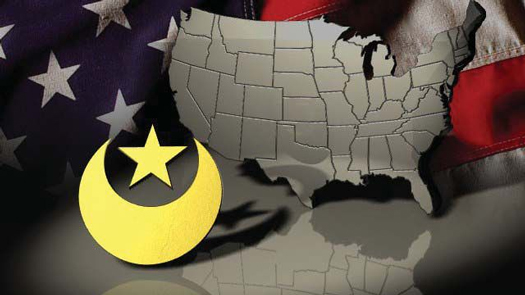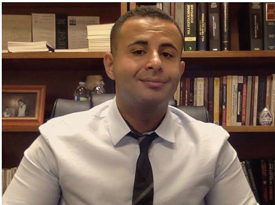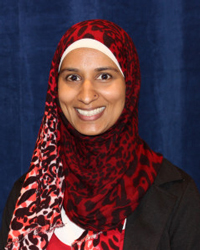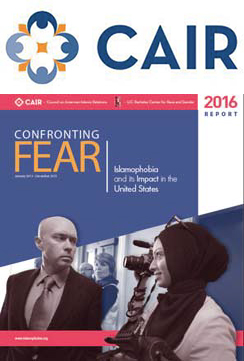Immigrant Muslims Owe Debt Of Gratitude To 'Black Muslims'
By Jehron Muhammad -Contributing Writer- | Last updated: Sep 6, 2016 - 10:11:07 AMWhat's your opinion on this article?

|
During a wide ranging interview about “Muslim America,” Khaled Beydoun, Associate Professor of Law at the University of Detroit Mercy School of Law, gave perspective to possible misperceptions about Muslims, especially as it relates to Black Muslims, the Nation of Islam, and to voting in the upcoming November elections.

Khaled Beydoun, Associate Professor of Law at the University of Detroit Mercy School of Law
|
In fact, one Muslim Bernie Sander’s delegate, at the Democratic National Convention (DNC), expressed her disappointment to this author, after Mr. Sanders put his support behind Hillary Clinton.
“I went in thinking that there would be something more revolutionary of him to tell us, in terms of next steps,” said Nausheena Hussain, Executive Director of the non-profit organization RISE (Reviving Islam Sisterhood for Empowerment).
The Arab American delegate from Minnesota said, she “had a hard time relating to Clinton.” She said, she “struggled” with her Wall Street campaign funding sources. In addition she said, “I don’t feel she understands what it’s like to be in the middle class, what it’s like to be in that social-economic status.”

Nausheena Hussain, Executive Director of the non-profit organization RISE (Reviving Islam Sisterhood for Empowerment)
|
“It’s almost like history is repeating itself, because everything that the Black community has gone through, from slavery to oppression to institutionalized racism, are all things that (we) as Muslims should be concerned with and we should be supporting and standing in solidarity with our brothers and sisters,” she said.
Professor Beydoun, whose parents are from Egypt and Lebanon, feels this “intersectionality” between Muslims and Black Lives Matter supporters is sacrosanct. He said some of Hillary Clinton’s harshest critics are Muslim Americans and African Americans.
“I think the one thing that’s unique about Muslim America is that you’ll find some of the strongest critics of the Democratic party emanate from Muslim America.
And its gearing specifically on Hillary Clinton and especially her foreign policy on Muslim majority states. Hillary Clinton being more hawkish than president Obama,” he said. In addition, he said, “Black Muslims,” in particular “are very skeptical and critical of Hillary Clinton, along the lines of her domestic policy.”

|
Policies that include her support of the Patriot Act, the crime bill and the “Urban areas Security Initiative” or USASI, which was created in 2003, and has been aimed at high-density Urban neighborhoods, as a response mechanism to alleged acts of domestic “terror.”
Highlighting the important role of indigenous Black Muslims, Professor Beydoun said the parallel struggles of Islamophobia and the issues raised by Black Lives Matter intersect in the African-American Muslim community.
“It’s important to note that Black Muslims are kind of betwixt and between these two movements, and obviously their experiences … compounds discrimination, along lines of Islamophobia and anti-blackness, and the violence we see,” he said.
Professor Beydoun, who was recently in Philadelphia attending the Black Muslim Psychology Conference, said, the worth of the Black Muslim experience “as an important story … because people typically think of Black Lives Matter movement and this emergence of Islamophobia as being parallel non-converging and non-intersecting.”
Nothing is further from the truth, he said. “If you look at the experience of Black Muslims, these are individuals that are at ground zero of both forms of discrimination.” Black Muslims represent over one-third of the American Muslim population.
Professor Beydoun encourages the wider Muslim community to “amplify the voices of Black Muslims,” this way he believes, you “intersect these two forms of discrimination,” and bridge the gap between the struggles happening in the Black and Muslim communities.
Concerning the religious rights enjoyed by Muslims in America, Professor Beydoun said, as a legal scholar, “A lot of the domestic civil rights progress in political empowerment of the African American community, which has had a collateral effect on the Muslims at large has been made possible by (the Hon. Elijah Muhammad’s) Nation of Islam.”

|
This “range of progress,” facilitated by the NOI, he acknowledges from a “legal and political standpoint,” in the “area of civil rights and civil liberties, have benefited Muslims of all races and of all sects.”
In one study, focusing on the religious rights of Muslim inmates, he attributes “Nation of Islam litigants,” as being responsible for such religious freedoms as “having a (Holy) Qur’an in prison, the ability to pray in prison, the ability to have Halal food.” Professor Beydoun said, “These are rights that all Muslims enjoy today that were made possible by the Nation of Islam.”
“So knowing that history, what I try to do as a legal scholar, is put the NOI and its contribution (of helping establish Islam in America) front and center, and demonstrate that without the Nation of Islam, I think that many of the rights, privileges and liberties that Muslims of all races and sects enjoy today would not have been possible.”
Concerning the November election, he believes it’s important to study Hillary Clinton and Donald Trump’s track record. But, he said, “If you choose to vote for Hillary Clinton,” he said, “to assume the risk and be cognizant of what that presidency entails and what it encompasses, and start preparing for the range of dangers associated with a Clinton presidency.”
INSIDE STORIES AND REVIEWS
-
-
About Harriett ... and the Negro Hollywood Road Show
By Rabiah Muhammad, Guest Columnist » Full Story -
Skepticism greets Jay-Z, NFL talk of inspiring change
By Bryan 18X Crawford and Richard B. Muhammad The Final Call Newspaper @TheFinalCall » Full Story -
The painful problem of Black girls and suicide
By Charlene Muhammad -National Correspondent- » Full Story -
Exploitation of Innocence - Report: Perceptions, policies hurting Black girls
By Charlene Muhammad -National Correspondent- » Full Story -
Big Ballin: Big ideas fuel a father’s Big Baller Brand and brash business sense
By Bryan Crawford -Contributing Writer- » Full Story






 Click Here Stay Connected!
Click Here Stay Connected!








